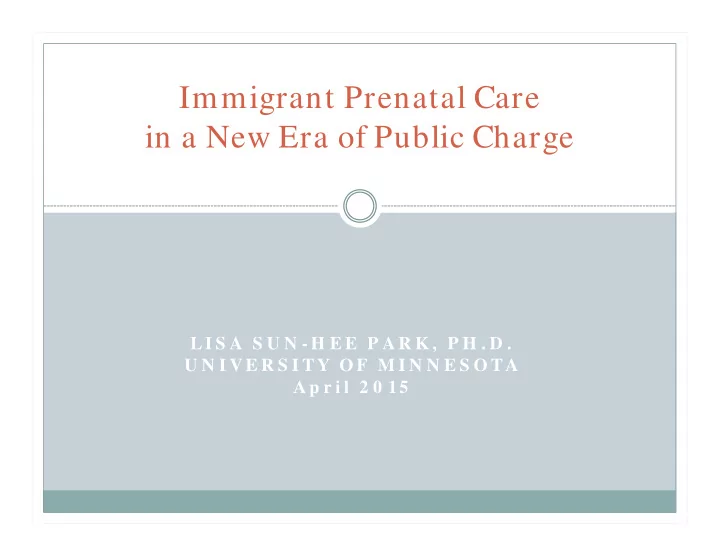

Immigrant Prenatal Care in a New Era of Public Charge LI S A S U N - H E E P A R K , P H . D . U N I V E R S I TY O F M I N N E S O TA A p r i l 2 0 15
Methods Key informant interviews with government agencies, safety-net clinics and hospitals, and immigrant advocacy organizations Three different regions: SF Bay Area, San Diego County, Fresno/ Central Valley N = 194
Department of Health Services ’ Border Projects Includes: Port of Entry Detection Program (PED): Began in November 1994 at three ports in San Diego (San Ysidro, Tecate, Calexico) California Airport Residency Program (CARR): Began in December 1994 at LAX, then expanded to SFO in 1996
DHS Port of Entry Fraud Detention Programs California State Audit Findings (1999) N = 440 Case Files 97% Women 86% 21 - 40 years old 80% Eligible only for pregnancy and emergency services 89% Families with children
California Airport Residency Program (CARR) LAX: 50% Mexico, El Salvador, Guatemala, Honduras; 17% Philippines, Korea, China SFO: 19% Mexico; 51% Philippines, Korea, China
Immigrant Prenatal Care in a New Era of Public Charge Rocio R. vs. Belshé, 1997 A Case Study in the Interconnection of Health care and Im m igration
Public Charge “Likely to become public charge” (LPC) Definition: A federal immigration agency term used to describe non-citizens who either have or m ay possibly becom e dependent on federal or state government benefits Possible consequences: Jeopardize future legal permanent residency; 1. Denied re-admission to the U.S.; 2. Deportation 3.
Immigrant Prenatal Care in a New Era of Public Charge
Immigrant Prenatal Care in a New Era of Public Charge LI S A S U N - H E E P A R K , P H . D . U N I V E R S I TY O F M I N N E S O TA A p r i l 2 0 15
Public Charge clarification, 1999: “ … ‘ public charge ’ means an individual who is likely to become primarily dependent on the government for subsistence, as demonstrated by either the receipt of public cash assistance for income maintenance or institutionalization for long ‐ term care at government expense. ” ‐‐ U.S. Citizenship and Immigration Services (CIS)
Immigrant Prenatal Care in a New Era of Public Charge LI S A S U N - H E E P A R K , P H . D . U N I V E R S I TY O F M I N N E S O TA A p r i l 2 0 15
Policy Approaches Working within illegality regimes— The State can be both the problem and the solution: Hold the State to its own rules (but be wary in doing so) Push for greater transparency Work across governmental agencies & interest groups Be wary of the politics of constructing deservingness. Pay attention to modes of inclusion as well as exclusion.
“ Many times, if there is a question about someone ’ s eligibility, an investigator is sent to their home to check to see if they really live there. They show up in uniform and armed with a gun. It ’ s really intimidating. They go inside and look through everything, including their underwear drawers to see if they actually live there. They count the underwear. Lots of times, they ’ ll go during the workday when no one ’ s home. If no one answers the door, then, they ’ re denied Medi- Cal. It ’ s invasive and you feel like a criminal. ”
1996 Federal Welfare Reform Personal Responsibility and Work Opportunity Reconciliation Act Created new categories of eligibility for immigrants (qualified vs. non-qualified based on date of arrival, work history, and income) Prohibited states from using federal Medicaid funds to cover non-emergency services, including prenatal care to non-qualified immigrations Required states to verify legal immigration status of Medicaid applicants with ICE to obtain federal participation Medicaid funds
1996 Federal Immigration Reform Illegal Immigration Reform and Immigration Responsibility Act Required sponsors of new immigrants to sign affidavits verifying incomes greater than 125% of the federal poverty level Included the income and assets of sponsors when determining eligibility for Medicaid (deeming) Gave states new authority to share Medicaid health information with ICE More efficient modes of removal (i.e. deportation)
Recommend
More recommend